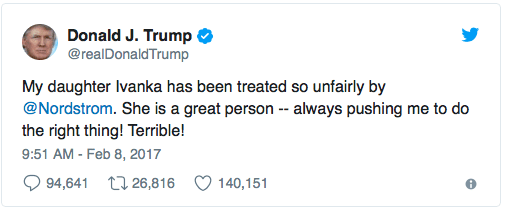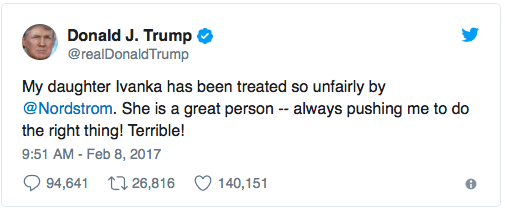
Social media is a double-edged sword in many ways. Many companies use social media to advertise their products or services to reach a broader realm of consumers, and many consumers share their own thoughts about companies and products judged as worthy for others to buy or to avoid. More so than ordinary users, celebrities often receive a lot of attention for who they promote and don’t support over different social networking sites. Matters of well-known people posting about companies they do not approve of became even more complex when the businessman and celebrity, Donald Trump, was elected president in 2016. Shortly after his inauguration, President Trump took to his twitter account to post his opinion on the major department store Nordstrom. This was brought about by their decision to remove Ivanka Trump’s clothing line from their stores.

This tweet was noticed. It generated thousands of shares, likes, and comments. In terms of market impact, CNN noted that “Nordstrom shares dipped a negligible 20 cents a share on the initial tweet, rebounding soon after and closing the day up 4 percent.” Nordstrom responded to the President’s tweet by emphasizing “the non-political nature of its decision to drop the Ivanka Trump line,” but this didn’t stop some people from responding with promises to boycott Nordstrom as a brand. Perhaps motivated by anti-Trump ire, some voiced their support for the store’s decision.
For a simple tweet, the waves this post created were quite strong. Making this matter more complex is that fact that a sitting American President is the one issuing this derogatory review of Nordstrom as a brand. Some believe that such opinions are below the dignity of the office of President. Specifically, CNBC pointed to the fact that “we’ve never seen a president as willing to criticize American companies as Trump has in the year since Election Day.” They also noted that previous presidents have not been as outspoken as President Trump is on social media. Others worry about the President’s power to voice his opinions about companies in a way that could impact their economic well-being. People tend to listen to and attribute power to the President, and “Nordstrom had reason to worry: Previous tweets from Mr. Trump calling out other brands, such as Lockheed Martin, had hurt share prices.”
Alternatively, presidents maintain the ability to speak their mind on matters they judge politically or socially important. For instance, President Obama took to Twitter in August 2015 and voiced his displeasure about the adverse effects of climate change with his tweet that said, “I refuse to condemn our kids to a planet that’s beyond fixing. Let’s meet this challenge and #ActOnClimate together.” In addition, President Trump and his supporters could see his opinionated tweets as possibly improving the public and the overall prosperity of the American economy.
As a company, Nordstrom was put at risk due to President Trump’s public tweets of disapproval in response to their public actions that had targeted Ivanka Trump and her product line. The President had reason to think this was an obvious way to respond to an economically harmful acts against his daughter, but his actions as Tweeter-in-Chief only add more dimensions to the debates over what constitutes ethical communication strategies by someone as powerful as the President.
Discussion Questions:
- Twitter is a quick and easy way to get messages out to masses of people. Should the President use twitter for important messages?
- What was the ethical problem, if any, with President Trump’s use of Twitter to criticize Nordstrom? Does Nordstrom’s action toward Ivanka Trump’s clothing line make any ethical difference in your analysis of the President’s Tweeting?
- Do the ethical obligations and concerns with free speech change when that speech is exercised by the U.S. President?
- What if the President wanted to praise Nordstrom for some action they did that pleased him? Would your ethical evaluation of presidential tweeting change?
- Is there any relevant difference between a president voicing their displeasure over some company or entity in a speech and a president tweeting such negative thoughts?
Further Information:
Janet Morrissey, “Brands heed Social Media. They’re advised not to forget Word of Mouth.” New York Times, November 26, 2017. Available at: https://www.nytimes.com/2017/11/26/business/media/advertising-social-media.html
Eamon Javers, “Trump holds an Unprecedented Presidential Power.” CNBC, November 8, 2017. Available at: https://www.cnbc.com/2017/11/08/trump-holds-an-unprecedented-presidential-power.html
Irina Ivanova, “President complains Nordstrom treated Daughter’s Business ‘Unfairly.’” CBS News, February 8, 2017. Available at: https://www.cbsnews.com/news/ivanka-trump-nordstrom-donald-trump-twitter-treated-so-unfairly/
Authors:
Anna Rose Isbell & Scott R. Stroud, Ph.D.
Media Ethics Initiative
University of Texas at Austin
February 8, 2018
Cases produced by the Media Ethics Initiative remain the intellectual property of the Media Ethics Initiative and the University of Texas at Austin. They can be used in unmodified PDF form without permission for classroom use. For use in publications such as textbooks, readers, and other works, please contact the Media Ethics Initiative.



